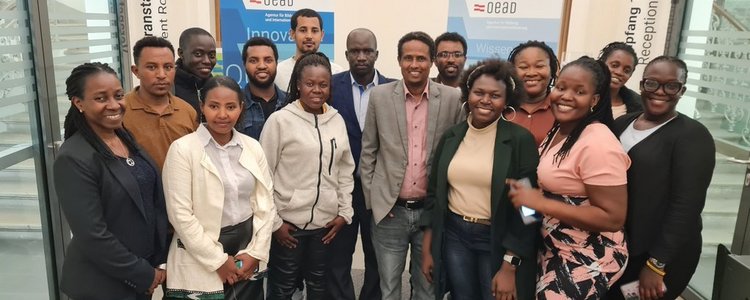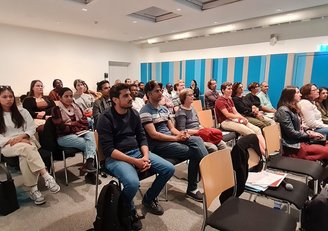The event held on 26 September 2024 at the OeAD in Vienna gave participants the opportunity to hear from Esther, who has made significant contributions to medical anthropology and public health.
On behalf of the OeAD, Elke Stinnig welcomed all guests and introduced the former APPEAR scholar and guest speaker. Esther Mukooza completed her PhD in 2019 at the University of Vienna with key links to the Medical University of Vienna. Her research was part of the partnership project with Gulu University "Master of Arts Program in Medical Anthropology and International Health (MA-MEDANIH)", funded by the Austrian Partnership Programme in Higher Education and Research for Development (APPEAR) and coordinated by Apl. Prof. Dr. Ruth Kutalek of the Unit of Medical Anthropology, Medical University of Vienna.
Elke Stinnig shared that she had known Esther since the beginning of her academic journey in Austria and appreciated her not only as a dedicated scholar but also as an exceptional individual. Esther's passion for her research is matched by her commitment to working with communities and making a meaningful contribution to society.
Since returning to Uganda, Esther has remained connected with OeAD and in 2020 she participated in the First General Assembly of the Austrian-African Research Network (Africa-UniNet), representing St. Lawrence University, Uganda which aims to be responsive to the needs of society through excellent teaching and research. She is responsible for the institution’s research domain with key focus on internationalisation and expanding the institution’s collaborative network. Esther has also maintained strong links with the Medical University of Vienna and is currently back in Austria for a post-doctoral fellowship in cooperation with Dr. Astrid Erber (Medical University of Vienna,Center for Public Health), supported by the Ernst Mach Follow-up grant financed by the Austrian Federal Ministry of Education, Science and Research (BMBWF).
Tackling Nodding Syndrome: Esther's Research Focus
Esther’s presentation, which lasted around 30 minutes, covered a range of topics, from medical anthropology to her doctoral research and her humanitarian work. Initially trained as a teacher, Esther’s career took a life-changing turn when she learned about “Nodding Syndrome”, a mysterious disease affecting children in northern Uganda. Characterised by seizures and repetitive head nodding, the illness remains poorly understood and, in many cases, fatal. Determined to help, Esther made nodding syndrome the focus of her PhD studies. During her fieldwork, she witnessed the harsh realities of life in rural Uganda, sharing emotional stories and pictures of children suffering from the illness which underscores the urgency of finding answers.
Esther highlighted how medical anthropology plays a crucial role in addressing population health needs through community-based research and interventions. Engaging directly with affected communities ensures that solutions are practical and tailored to real-world challenges. By applying social science insights to medical settings, healthcare providers can better understand the multi-faceted nature of health, illness and disease and be in a better position to offer holistic healthcare solutions as well as develop more effective and sustainable interventions.
Humanitarian Work with MSF: Global Impact
After completing her doctoral studies, Esther worked as a medical anthropologist and later also coordinated epidemiologic activities with Doctors Without Borders (Médecins Sans Frontières, MSF), where she spent four years in Eswatini. In her role, she defined, coordinated, and monitored epidemiologic activities and operational research work related to HIV, TB and sexually transmitted infections. Of note is that this work involved and revolved mainly around key and vulnerable populations whose access to healthcare was limited.
Her research has richly contributed to the existent scientific body of knowledge with findings disseminated at several international conferences and through peer reviewed journal publications. Esther's dedication to improving the lives of vulnerable populations demonstrates the powerful impact of combining academic research with humanitarian action.
In 2024, Esther was awarded an Ernst Mach Follow-up grant to continue her research on Nodding Syndrome at the Medical University of Vienna. Additionally, this opportunity will allow her to expand her research collaborations both locally and internationally.
Tips for Current and Future Scholars
Esther concluded her presentation with valuable advice for current and future scholarship holders in Austria. She emphasized the importance of thorough preparation before arrival, including setting clear goals and timelines, gathering information about ones stay from diverse sources, and planning for future collaborations and career development.
Once in Austria, she advised scholars to make the most of their time by sticking to their work plan, closely engaging their supervisors, and proactively connecting with both university staff and the local community. Esther also stressed the importance of staying motivated and finding a personal goal or mantra to keep you going through challenging times. Her message was simple but powerful: "Never give up".
A Memorable Event
The presentation was followed by a lively Q&A session, where participants had the chance to ask Esther questions about her experiences. The talk concluded with a social event featuring delicious Ugandan food and drinks, providing a wonderful opportunity for networking and cultural exchange.
Esther’s journey is a testament to the power of passion, perseverance and community-focused research, and her talk left participants inspired and motivated to pursue their own paths with dedication and heart.

